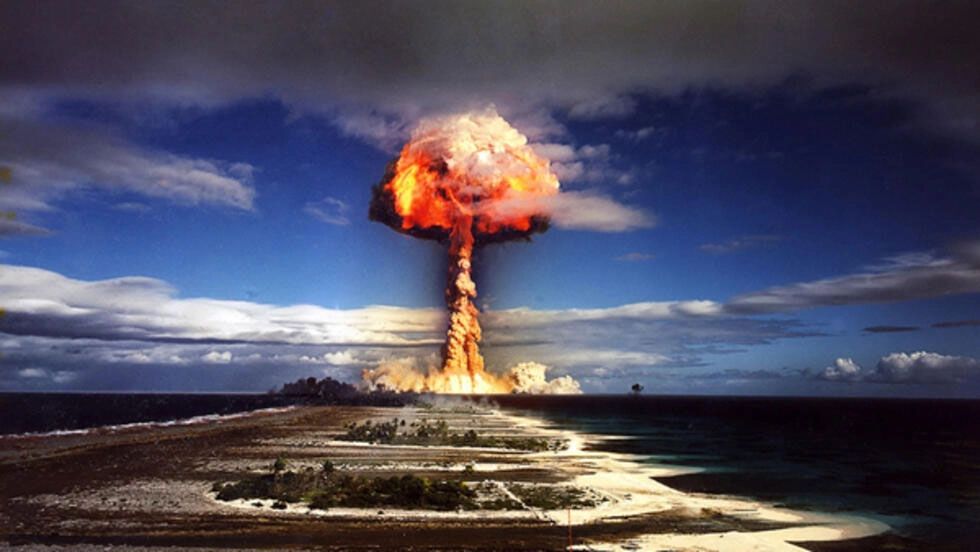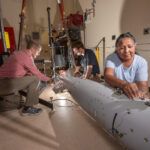A small victory for nuclear justice. And international cooperation.
By Ivana Nikolić Hughes, Christian Ciobanu | November 3, 2023
 A French nuclear bomb test at Mururoa Atoll, 1970. Source: Wikimedia Commons
A French nuclear bomb test at Mururoa Atoll, 1970. Source: Wikimedia Commons
In contrast with the grandeur of the General Assembly Hall, the uplifting design of the Trusteeship Council room, and the stunning circular table in the Security Council Chamber, Conference Room 4 at the UN Headquarters is modest and unassuming. And yet, magic can happen there. When the heads of state are long gone and even the ministers have departed New York, diplomats push forward agendas to advance international cooperation on any number of international issues. They give statements, engage in debates publicly and privately, and vote for resolutions and more, often late into the night.
A kind of diplomatic magic took place last Friday night. Voting on a series of resolutions in what is referred to as the “nuclear weapons cluster” of the United Nations General Assembly’s First Committee (which deals with disarmament and international security), diplomats considered for the first time a resolution entitled: “Addressing the Legacy of Nuclear Weapons: Providing Victim Assistance and Environmental Remediation to Member States Affected by the Use or Testing of Nuclear Weapons.” The first such victims came into being when the United States conducted its first nuclear weapons test in New Mexico and then used nuclear weapons in attacks on Hiroshima and Nagasaki in the summer of 1945.
But nuclear explosions continued over the decades and around the world, in the form of nuclear weapon tests. The victim counts are easily in the millions.
Two of the countries affected by nuclear weapons testing, the Republics of Kazakhstan and Kiribati (from Soviet Union and United Kingdom/United States tests, respectively), brought the resolution forward and advocated broadly for its adoption. The result of their work became obvious when the voting began at roughly 6:30 p.m., and a sea of green checks began to fill the screens displaying the results. With 40 co-sponsors and many countries confirming in advance that they would vote in support of the resolution, the adoption was inevitable.
Still, it would be hard to overstate what a victory it was to have 171 countries vote in support of this resolution, with only four no votes and six abstentions. This was not only a triumph for those impacted by nuclear weapons use and testing but also for international cooperation. Especially at a time when UN resolutions seem to be supported on the basis of who likes whom (or perhaps even more so, who doesn’t like whom), having 171 states stand for those who have been harmed by nuclear weapons and whose environments may still be contaminated is welcome and long overdue.
In an unlikely alliance under most other circumstances, the Democratic People’s Republic of Korea (that is, North Korea), France, Russia, and the United Kingdom all voted no. Their stance is shameful, given the context of nuclear colonialism embodied by the French nuclear testing program in Algeria and French Polynesia and the United Kingdom’s testing in Australia and Kiribati. Better than voting no, the other nuclear weapon possessors—China, India, Israel, Pakistan, and the United States—all abstained. (So did the Democratic Republic of the Congo, a non-nuclear weapons country that supports the nuclear ban treaty.) It was encouraging to see that the United States abstained rather than voting no alongside France and the United Kingdom.
None of the nine countries that possess nuclear weapons voted in favor of the resolution, leaving them isolated. Since they caused the harm and the contamination that are the topic of the resolution, voting yes on this resolution at the earliest opportunity could become the first step towards redeeming themselves and righting these historical wrongs. When the resolution comes up for a vote in December in the General Assembly, they should all reverse their votes and vote yes. They owe it to the victims and their descendants.
Upon adoption in the General Assembly in December, this resolution will pave the way for the long and hard process of information gathering and needs appraisal in affected states, followed by actual steps to assist victims and assess and remediate contaminated environments. Such work has already begun within the context of the Treaty on the Prohibiton of Nuclear Weapons (TPNW), but bringing these conversations into the broader sphere is critical. Future versions of the resolution can build in further binding steps.
The world cannot afford to create more victims of nuclear weapons or to contaminate more environments. In fact, indications are that all of humanity and life on the planet would become a victim in case of nuclear war using today’s arsenals. Therefore, while they’re deciding to come around and help victims of past nuclear weapons use and testing, the nuclear weapons countries should also recommit to nuclear disarmament in a verifiable and time-bound manner. There are lots of options for them to do so—through numerous resolutions that were also voted upon on Friday, but also through joining and/or meeting their existing obligations under key treaties, including the Nuclear Non-Proliferation Treaty, the Comprehensive Test Ban Treaty, and the TPNW. Helping existing victims is but one step. Getting rid of nuclear weapons is the only way to ensure there will be no more.
Together, we make the world safer.
The Bulletin elevates expert voices above the noise. But as an independent nonprofit organization, our operations depend on the support of readers like you. Help us continue to deliver quality journalism that holds leaders accountable. Your support of our work at any level is important. In return, we promise our coverage will be understandable, influential, vigilant, solution-oriented, and fair-minded. Together we can make a difference.
Keywords: KiribatiKazakhstan, environmental remediation, nuclear weapons testing, victim assistance
Topics: Nuclear Weapons
















